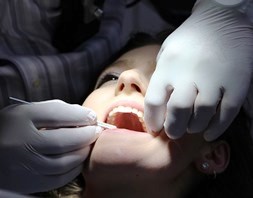Dental Hygiene Schools
How to Select the Right One Near Kansas City Missouri
 Picking the right dental hygienist college near Kansas City MO is an essential first step toward launching your new career in dentistry. But prior to making your choice, you must evaluate and compare your school options. Picking the program with the most affordable tuition or enrolling in the school that is closest to your home is not the best way to make your decision. A dentistry school's reputation and accreditation are also important factors and should be considered as well. Dental hygienists usually earn an Associate Degree, as compared to a certificate usually earned by assistants, and can take anywhere from two to three years to accomplish. Obviously with the lengthier training of a hygienist comes more cost. We will cover all of these factors and additional questions that you need to be asking the dental hygienist programs you are reviewing later in this article. But first, let's look at the duties of dental hygienists and the training programs offered.
Picking the right dental hygienist college near Kansas City MO is an essential first step toward launching your new career in dentistry. But prior to making your choice, you must evaluate and compare your school options. Picking the program with the most affordable tuition or enrolling in the school that is closest to your home is not the best way to make your decision. A dentistry school's reputation and accreditation are also important factors and should be considered as well. Dental hygienists usually earn an Associate Degree, as compared to a certificate usually earned by assistants, and can take anywhere from two to three years to accomplish. Obviously with the lengthier training of a hygienist comes more cost. We will cover all of these factors and additional questions that you need to be asking the dental hygienist programs you are reviewing later in this article. But first, let's look at the duties of dental hygienists and the training programs offered.
It Takes Just a Few Minutes to Start Your Dental Hygienist Career Below
Dental Hygienist Job Description

When comparing the role of a dental assistant to that of a hygienist, the main difference is probably that the hygienist works more independently. Dental assistants work with and assists the Kansas City MO dentists and the practice. Hygienists, while also supporting the practice, work with the patients more on a one-to-one basis. They are typically the initial person a patient sees when called from the waiting room. They examine every patient's gums and teeth and report their findings to the dentists. They also may perform basic procedures. Based on state law, a hygienist's responsibilities can include:
- Removing stains, tartar and plaque
- Applying fluoride treatments
- Polishing teeth and applying sealants
- Educating patients about oral hygiene
- Taking X-rays and developing film
- Applying fillings and removing sutures
Dental Hygienist Education Options
As a result of the added responsibility as compared to an assistant, dental hygienists working in Kansas City MO dental practices are generally required to hold an Associate Degree in dental hygiene rather than a certificate. These programs can require anywhere from two to as long as three years to complete and must be accredited by the CDA in almost every state. They are offered in trade and vocational schools as well as community colleges. And in addition to classroom studies learning the fundamentals of dental hygiene, there will be a practical component to the training as well. Many programs also offer internships with local dentists or dental practices.Online Dental Hygienist Training
 Enrolling in an online dental hygienist program might be a great alternative for getting your training. Just remember that the program will not be completely online, since there will be a practical component to your training. But the rest of your classes will be accessible via your personal computer in the convenience of your Kansas City MO home or anywhere else on your laptop or tablet. For those working while attending school, online dental programs make education far more accessible. Many may even charge lower tuition fees than their on-campus competitors. And additional expenses for items like commuting, books and school supplies may be reduced as well. The practical training can often be completed at a community dental office or in an on-campus lab. With both the online and clinical training, everything required to receive the appropriate education is provided. If you have the dedication for this method of learning, you may find that enrolling in an dental hygienist online school is the best option for you.
Enrolling in an online dental hygienist program might be a great alternative for getting your training. Just remember that the program will not be completely online, since there will be a practical component to your training. But the rest of your classes will be accessible via your personal computer in the convenience of your Kansas City MO home or anywhere else on your laptop or tablet. For those working while attending school, online dental programs make education far more accessible. Many may even charge lower tuition fees than their on-campus competitors. And additional expenses for items like commuting, books and school supplies may be reduced as well. The practical training can often be completed at a community dental office or in an on-campus lab. With both the online and clinical training, everything required to receive the appropriate education is provided. If you have the dedication for this method of learning, you may find that enrolling in an dental hygienist online school is the best option for you.
What to Ask Dental Hygienist Schools
Now that you have decided to become a dental hygienist in Kansas City MO, you can start the procedure of comparing schools and programs. As we covered at the opening of this article, many prospective students start by checking out the cost and the location of the colleges. Maybe they look for some online alternatives also. Even though these are important initial factors to consider, there are several additional questions that you need to address to the schools you are looking at in order to make an informed decision. To start that process, we have provided a list of questions to assist you with your evaluation and final selection of the right dental hygienist college for you.
Is the Dental School Accredited? There are several good reasons why you should only select an accredited dental hygienist school. If you are intending to become licensed or certified, then accreditation is a condition in almost all states. To qualify to take the National Board Dental Hygiene Exam, your dental school must be accredited by the Commission on Dental Accreditation (CDA). Accreditation also helps establish that the education you receive is of the highest quality and comprehensive. Kansas City MO employers frequently desire or require that new hires are graduates of accredited schools. And finally, if you are requesting a student loan or financial aid, usually they are not obtainable for non-accredited schools.
Is Sufficient Clinical Training Included? Clinical or practical training is an essential part of every dental training program. This is true for the online college options as well. Many dental hygienist schools have relationships with local dental offices and clinics that provide clinical training for their students. It's not only essential that the college you enroll in offers enough clinical hours but also provides them in the kind of practice that you subsequently would like to work in. As an example, if you are interested in a career in pediatric dentistry, confirm that the program you enroll in offers clinical rotation in a local Kansas City MO dental office that specializes in dental services for children.
Is There an Internship Program? Ask if the dental schools you are considering have an internship program. Internships are probably the most effective method to receive hands-on, clinical experience in a real dental practice. They help students to transition from the theoretical to the practical. They can also help students build professional relationships in the Kansas City MO dentistry community. And they are attractive on resumes too.
Is Job Placement Help Furnished? Most graduating students of dental hygienist programs need help landing their first job. Ask if the programs you are researching have job assistance programs, and what their job placement rates are. Programs with high job placement rates probably have excellent reputations within the Kansas City MO dental community as well as broad networks of contacts where they can refer their students for employment or internships.
Are the Classes Smaller? Find out from the colleges you are evaluating how large typically their classrooms are. The smaller classes usually offer a more personal setting for learning where students have increased access to the instructors. On the other hand, larger classes can be impersonal and provide little individualized instruction. If practical, find out if you can monitor a few classes at the Kansas City MO dental hygienist college that you are leaning toward in order to experience first hand the level of interaction between instructors and students before making a commitment.
What is the Total Cost of the Program? Dental hygiene training can differ in cost dependent on the length of the program and the amount of clinical training provided. Other factors, for instance the reputations of the schools and whether they are private or public also come into play. But along with the tuition there are other significant costs which can add up. They can include costs for such things as textbooks and commuting as well as school equipment, materials and supplies. So when analyzing the cost of colleges, remember to add all of the expenses associated with your education. Most colleges have financial assistance offices, so be sure to find out what is available as far as grants, loans and scholarships in the Kansas City MO area.
Are the Classes Convenient? Before enrolling in a dental hygienist school, you must make sure that the hygienist or assistant program furnishes classes that fit your schedule. This is especially true if you will be working while receiving your education and have to go to classes near Kansas City MO in the evenings or on weekends. And even if you choose an online school, you will still have to schedule your practical training classes. Also, while making your inquiries, ask what the make-up policy is if you should have to miss any classes due to work, illness or family emergencies.
Find Out More About Training to Become a Dental Hygienist in Kansas City
Enroll in the Right Kansas City Dental Hygienist Program
Choosing the right dental hygienist program is important if you want to take the National Board Dental Hygiene exam or, if required in your state, become licensed. As we have covered, there are numerous options offered to receive your education and it takes a relatively short period of time to become a dental hygienist. You can acquire your formal education through dental hygienist programs at community colleges, vocational schools, technical institutes and trade schools. Graduates of these programs typically receive an Associate Degree. Dental Hygienists normally require about two years of studies before they enter the work force. When obtaining a degree you can elect to attend classes on-campus or online. Whichever mode of training you choose to pursue, by asking the questions provided in this article you will be in a better position to make the ideal choice. And by doing so, you will be ready to start your journey toward becoming a dental hygienist in Kansas City Missouri.
Kansas City Dental Hygienist Schools Online | Kansas City Dental Hygienist Colleges
